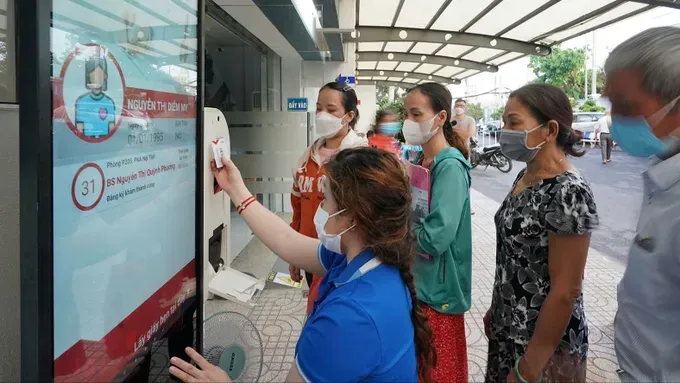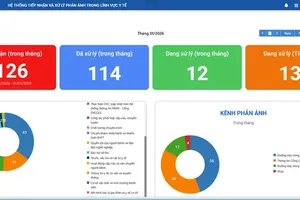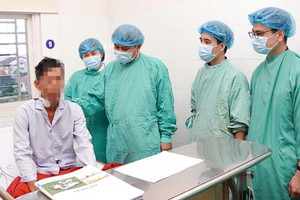
They are investing in modern medical equipment and shifting the focus from simply treating diseases to actively preventing them.
This move is already benefiting patients like Le Thi Kien, an 82-year-old with diabetes and heart disease. The old woman used to find her monthly check-ups at Thong Nhat Hospital exhausting, now enjoys a much smoother process. "I used to have to carry my health insurance card and medical records with me, and sometimes I'd forget and had to go back home, which was very tiring. Now it's so much easier," she said.
Ms. Kien is among tens of thousands of patients in the city who are benefiting from electronic health records. With online appointment scheduling, patients no longer have to wait for registration numbers, saving them significant time.
Dr. Truong Quang Anh Vu, Head of the Examination Department at Thong Nhat Hospital, noted that the hospital, a leading center for cardiovascular and geriatric care, is striving to become a comprehensive geriatric hospital. Considering that more than 70 percent of their patients are senior citizens, the hospital has assigned personnel to assist patients with the use of numerous Tekmedi kiosks, thereby enhancing the convenience of the process.
Furthermore, they initiate medical examinations as early as 5 a.m. to better serve patients.
Meanwhile, at Ba Ria - Vung Tau Mental Health Hospital, administrators have also implemented an electronic kiosk system and electronic health records. A representative of the hospital's Board of Directors noted that these systems have been crucial in streamlining registration and payments, especially given the unique challenges of treating patients with varying states of consciousness.
Patients can conveniently access information, obtain a queue number, and complete cashless transactions within a matter of minutes. This not only saves time but also alleviates congestion at the reception desk, lessens the burden on medical personnel, and aids in hastening the industry's digital transformation process.
In alignment with Resolution 72, Dr. Lam Tuan Tu, Director of Vung Tau Hospital, has characterized the directive as a strategic move that presents an opportunity for fundamental and comprehensive reform of the healthcare system. He asserts that this will ensure equitable access to high-quality healthcare services for all people, regardless of their location. Dr. Tu advocates for the city to prioritize budget allocation for the construction of new hospitals, the renovation and expansion of existing facilities, and the development of specialized departments. Furthermore, he calls for the procurement of modern medical equipment, including MRI and CT machines, as well as international-standard laboratories, endoscopic surgery devices, and surgical robots.
Associate Professor Phung Nguyen The Nguyen, Head of the Faculty of Medicine and the Department of Pediatrics at the University of Medicine and Pharmacy in Ho Chi Minh City, expressed his approval of the resolution’s emphasis on shifting from a treatment-centric approach to a proactive disease prevention model. He highlighted the importance of a greater focus on preventive medicine, primary healthcare, and traditional medicine to ensure early, remote, and grassroots disease prevention. This, he noted, will comprehensively improve healthcare service quality, develop specialized care, and ensure health security.
According to Dr. Nguyen, a significant increase in non-communicable diseases and an aging population necessitate a higher quality of health services. To achieve this, he states, "bottlenecks" in facilities, human resources, and the application of information technology for digitizing electronic health records must be addressed. He urges the healthcare sector to propose the renovation and reconstruction of dilapidated medical facilities, such as Ho Chi Minh City Mental Hospital, Ho Chi Minh City Tropical Diseases Hospital, and Ho Chi Minh City Orthopedic Trauma Hospital, as well as other overcrowded primary care hospitals.
Additionally, he stresses the need to ensure an adequate and properly allocated healthcare workforce, with each health station staffed by a family doctor, a community nurse, a pharmacist, and a rehabilitation technician. He emphasizes that resource allocation should be based on a "disease map" and the specific needs of each area, rather than a uniform distribution. Primary healthcare workers, he adds, should be retrained in family medicine, chronic disease management, infection prevention, and continuous life-cycle care to shift their focus from reactive treatment to proactive community health maintenance.
According to data from the Ho Chi Minh City Department of Health, the city currently has 162 hospitals, including 32 general hospitals, 28 specialized hospitals, and 90 private hospitals. The annual number of outpatient visits has increased from 42 million to 51 million, while the number of hospital beds has decreased from 42 to 35.1 per 10,000 people. To enhance patient care, the city aims to implement electronic health records, which will not only reduce the administrative burden but also improve service quality. The city has set a target for 95 percent of its population to have an electronic health record by 2030.
























